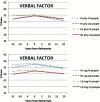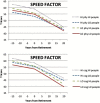Effects of Preretirement Work Complexity and Postretirement Leisure Activity on Cognitive Aging
- PMID: 25975289
- PMCID: PMC4982383
- DOI: 10.1093/geronb/gbv026
Effects of Preretirement Work Complexity and Postretirement Leisure Activity on Cognitive Aging
Abstract
Objectives: We examined the influence of postretirement leisure activity on longitudinal associations between work complexity in main lifetime occupation and trajectories of cognitive change before and after retirement.
Methods: Information on complexity of work with data, people, and things, leisure activity participation in older adulthood, and four cognitive factors (verbal, spatial, memory, and speed) was available from 421 individuals in the longitudinal Swedish Adoption/Twin Study of Aging. Participants were followed for an average of 14.2 years (SD = 7.1 years) and up to 23 years across eight cognitive assessments. Most of the sample (88.6%) completed at least three cognitive assessments.
Results: Results of growth curve analyses indicated that higher complexity of work with people significantly attenuated cognitive aging in verbal skills, memory, and speed of processing controlling for age, sex, and education. When leisure activity was added, greater cognitive and physical leisure activity was associated with reduced cognitive aging in verbal skills, speed of processing, and memory (for cognitive activity only).
Discussion: Engagement in cognitive or physical leisure activities in older adulthood may compensate for cognitive disadvantage potentially imposed by working in occupations that offer fewer cognitive challenges. These results may provide a platform to encourage leisure activity participation in those retiring from less complex occupations.
Keywords: Cognitive aging; Growth curve analysis; Leisure activity; Retirement; Work complexity.
© The Author 2015. Published by Oxford University Press on behalf of The Gerontological Society of America. All rights reserved. For permissions, please e-mail: journals.permissions@oup.com.
Figures



References
-
- Andel R. Crowe M. Pedersen N. L. Mortimer J. Crimmins E. Johansson B., & Gatz M (2005). Complexity of work and risk of Alzheimer’s disease: a population-based study of Swedish twins. The Journals of Gerontology, Series B: Psychological Sciences and Social Sciences, 60, P251–P258. - PubMed
-
- Andel R. Infurna F. J. Rickenbach Hahn E. A. Crowe M. Marchiondo L., & Fisher G. G (2015). Job strain and trajectories of change in episodic memory before and after retirement: results from the Health and Retirement Study. Journal of Epidemiology and Community Health, 69, 442–446. doi:10.1136/jech-2014-204754 - PubMed
-
- Andel R. Kareholt I. Parker M. G. Thorslund M., & Gatz M (2007). Complexity of primary lifetime occupation and cognition in advanced old age. Journal of Aging and Health, 19, 397–415. doi:10.1177/0898264307300171 - PubMed
-
- Andel R. Silverstein M., & Kåreholt I (2015). The role of midlife occupational complexity and leisure activity in late-life cognition. The Journals of Gerontology Series B: Psychological Sciences and Social Sciences, 70, 314-321. doi: 10.1093/geronb/gbu110 - PubMed
Publication types
MeSH terms
LinkOut - more resources
Full Text Sources
Other Literature Sources
Medical

